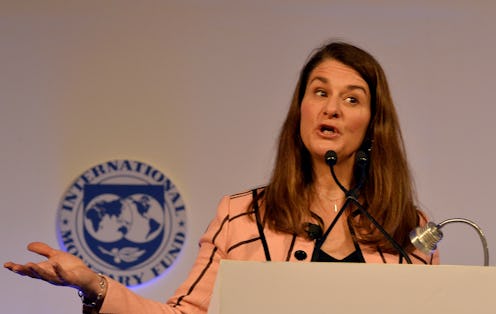News
Melinda Gates' Plan To Make Poverty Less Sexist
Every year, the Bill & Melinda Gates Foundation releases an annual letter that tackles one of the most prevalent global issues. The annual 2016 letter, released on Feb. 22, answered the question, "If you could have one superpower, what would it be?" Although the question may not immediately make you think of gender inequality, in the letter, Melinda Gates focused her response on solving the issue of disproportionate unpaid work among men and women around the world. As a follow-up, Lenny, the email newsletter and website started by Lena Dunham, interviewed Melinda about how poverty is a sexist issue as well as an economic issue. Specifically focusing on Mumbai, India, in this interview, Melinda outlined how men can do more unpaid work around the world.
Although the interview was mostly about how poverty is sexist, Melinda had an interesting perspective about what strategies would look like in different parts of the world that would encourage men to do more unpaid labor. In every part of the world, women spend more time on unpaid work than men. In the annual letter from the Bill & Melinda Gates Foundation, unpaid work is separated into three categories: cooking, cleaning, and caring for children and the elderly. These are typically stereotypical roles that burden women and prevent them from pursuing other goals, which is where Melinda's proposal becomes crucial in achieving economic gender parity.
In India, women spend approximately six hours per day on unpaid work while men spend less than one hour each day. As women spend more and more time on unpaid work that requires them to be in the house, they have less time and resources to pursue things like school or paid work. In her interview, Melinda made an important distinction that implementing effective strategies to get men to do more unpaid work starts with the way we as a society understand unpaid work. Said Melinda:
Recognizing first that it's a global problem is important. I would love to see us measure unpaid labor as part of gross domestic product worldwide. There's no reason that we don't. It's one of those hidden, root inequities. Our economies are built on the backs of all this unpaid labor that women do. I would start there.
By altering the way we calculate GDP, we could better understand income inequality and how to boost economic competition to achieve gender parity. It's imperative to frame unpaid work as global issue, as men spend significantly more time on paid work around the world, including things like leisure activities and hanging out with friends, according to OECD data.
In addressing the issue of the five-hour gap between men and women's unpaid work in Mumbai, India, Melinda said in her interview that it starts with actively trying to change these stereotypical roles between genders. After thinking through how to alter the roles, Melinda proposed different ways to implement economic change in different countries around the world:
But you also have to introduce labor-saving devices. Like in Africa, if somebody doesn't have fuel, they're still going and collecting firewood. If they get an oven, that's a huge difference. You can do things to reduce the inequities by making sure that they can get clean energy, safe energy. To make sure they're not having to collect water every day. That's huge for women in the developing world.
However, Melinda recognized that in the United States, introducing labor-saving devices is not the way to solve the issue of unpaid work among men and women; rather, we need to make policy changes that help women achieve economic equality with men. Specifically, Melinda talked about the continuing issue of denying women paid maternity leave from work.
There's just no reason we don't have a great family-paid-leave act here in the United States. There's different ways you can get at that, whether at the state level or the federal level. We also ought to recognize that unpaid labor falls predominantly to women.
In addition to paid maternity leave, Melinda proposed an innovative way to normalize the idea of men doing more unpaid work: through advertising.
The other thing I would do in countries like the U.S. is to show more men, even in TV ads, doing household work. Only two percent of ads show men doing chores, and yet we know they actually do several hours of it in real life. Those images affect young boys and girls.
Melinda made a crucial point in normalizing these roles for both sexes, as the difference starts early in the United States. American girls ages 10 to 17 spend two more hours than boys on chores each week, and boys are 15 percent more likely to be paid for doing chores, according to a University of Michigan study.
Poverty and unpaid work disproportionately affect women around the world. If we don't focus on ways to better understand the negative impacts of unpaid work, as well as how to encourage men to do more unpaid work, income inequality and achieving gender parity will become increasingly difficult to solve. Gates proposed innovative global ways for men to pick up the slack for women who otherwise think they are forced into hours of unpaid work each day, which prevents them for pursuing paid work opportunities and, at times, education.
